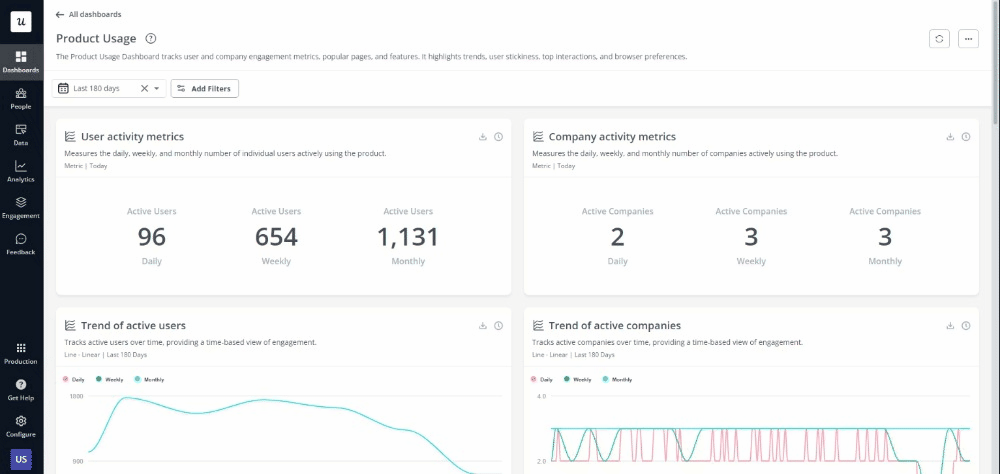
Whether you’re looking to deepen your expertise, stay updated with industry trends, or find practical tools to enhance your workflow, the right resources are essential for continuous growth and success.
This guide will introduce you to the best resources available for UX strategists, providing you with a curated selection of valuable materials to enhance your skills and knowledge.
Try Userpilot Now
See Why 1,000+ Teams Choose Userpilot

What is a UX strategist?
A UX strategist blends user experience design with business goals to create cohesive digital products.
In SaaS, they optimize user onboarding, increase product adoption, and ensure seamless feature integration, working closely with product managers and developers to align the user experience with strategic objectives.
What does a UX strategist do?
A UX strategist develops and implements strategies to improve the overall user experience of digital products. They conduct user research, create user personas, and map out user journeys to identify pain points and opportunities for enhancement.
They also focus on optimizing user onboarding processes, increasing product adoption, and ensuring the seamless integration of new features.
UX strategist’s main responsibilities
A UX strategist plays a crucial role in aligning user experience design with business goals to create effective and engaging digital products, especially in the SaaS industry.
- User research: Conduct comprehensive user research to gather insights into user behaviors, needs, and pain points.
- Persona development: Create detailed user personas to guide design decisions and ensure they align with user needs.
- User journey mapping: Develop and map out user journeys to identify key touchpoints and areas for improvement.
- Strategy development: Formulate and implement UX strategies that enhance user onboarding, increase product adoption, and ensure seamless feature integration.
- Collaboration: Work closely with product managers, developers, and other stakeholders to ensure design decisions support business objectives.
- Usability testing: Plan and conduct usability testing to validate design concepts and gather feedback for continuous improvement.
- Analytics and reporting: Utilize analytics to measure the effectiveness of UX strategies and report findings to stakeholders.
- Continuous improvement: Stay updated with the latest UX trends, tools, and methodologies to continuously enhance the user experience.
- Competitive analysis: Analyze competitors’ products to identify best practices and opportunities for differentiation.
- Documentation: Maintain detailed documentation of research findings, design decisions, and strategy implementations for future reference.
Best resources for UX strategists
To excel as a UX strategist, it’s crucial to continually learn and stay updated with the latest trends, techniques, and insights. Here are some of the best books, webinars, podcasts, blogs, and certifications that can help you enhance your UX strategy skills.
Best books for UX strategists
Books provide in-depth knowledge and foundational principles essential for UX strategists.
- The Design of Everyday Things by Don Norman: A classic that delves into the principles of user-centered design and the psychology behind effective usability.
- Don’t Make Me Think by Steve Krug: A practical guide to web usability and intuitive design, focusing on making websites easy to use.
- Lean UX by Jeff Gothelf and Josh Seiden: Combines lean startup principles with user experience design, promoting collaboration and iterative processes.
- About Face: The Essentials of Interaction Design by Alan Cooper: Comprehensive coverage of interaction design principles and techniques, essential for creating engaging interfaces.
- Hooked: How to Build Habit-Forming Products by Nir Eyal: Offers insights into creating products that users can’t put down, focusing on behavior-driven design.
Best webinars for UX strategists
Webinars offer the opportunity to learn from industry experts and stay current with UX trends.
- Userpilot Webinars: Regular sessions on user onboarding, product adoption, and UX best practices, led by industry experts.
- NN/g (Nielsen Norman Group) Webinars: Expert-led webinars on various UX topics and usability research findings, providing actionable insights.
- UX Design Institute Webinars: Webinars covering a range of UX design and strategy topics, helping you stay updated with the latest trends.
- Interaction Design Foundation (IDF) Webinars: Insights from industry experts on UX research, design, and strategy, with practical applications.
- Adobe XD Webinars: Training and insights on using Adobe XD for UX design, offering tips and best practices from professionals.
Best blogs for UX strategists
Blogs provide regular updates, insights, and tips to keep your UX strategy sharp.
- Userpilot Blog: Articles on user onboarding, product adoption, and UX best practices, with actionable tips.
- NN/g (Nielsen Norman Group) Blog: Research-based articles on usability and user experience, offering deep insights.
- Smashing Magazine: Comprehensive articles on UX design, coding, and content strategy, catering to various skill levels.
- UX Planet: A community-driven blog with articles on various UX topics, providing diverse viewpoints and tips.
- UX Collective: Curated stories on UX, product design, and usability, featuring contributions from industry experts.
Best podcasts for UX strategists
Podcasts are a great way to stay informed and inspired on the go.
- Userpilot Product Heroes: Discussions on user onboarding, engagement, and UX best practices, featuring industry leaders.
- UI Breakfast: Interviews with industry experts about UI/UX design, product strategy, and business, providing valuable insights.
- The UX Podcast: Covers UX design, research, strategy, and everything in between, offering diverse perspectives.
- What is Wrong with UX: A humorous take on UX design challenges and solutions, making learning fun.
- Design Better Podcast: Insights from top designers on improving design processes and outcomes, focusing on practical advice.
Best certifications for UX strategists
Certifications can validate your skills and enhance your professional credibility.
- NN/g UX Certification: Comprehensive certification covering various aspects of UX design and research, recognized globally.
- Interaction Design Foundation (IDF) Certification: Affordable, self-paced courses with recognized certifications, focusing on practical skills.
- UX Design Institute Professional Diploma in UX Design: An industry-recognized diploma with a focus on UX principles and practice, providing in-depth knowledge.
- Coursera’s Google UX Design Professional Certificate: A thorough program developed by Google to prepare you for a career in UX, covering essential skills.
- HFI Certified Usability Analyst (CUA): Focuses on usability principles and practices, providing a solid foundation for UX professionals.
Best tools for UX strategists
A UX strategist needs a suite of tools to efficiently manage projects, understand user behavior, design intuitive interfaces, and ensure overall customer satisfaction. Here are 10 essential tools that every UX strategist should consider integrating into their workflow:
- Best tool for user engagement and feedback – Userpilot: Userpilot helps you create personalized in-app experiences without coding, making it easier to onboard users, increase product adoption, and collect user feedback.
- Best tool for project management – Monday.com: Monday.com provides an intuitive interface for managing projects, tasks, and team collaboration, helping UX strategists keep everything on track and visible.
- Best tool for product management – Jira Software: Jira Software is ideal for agile project management, offering powerful features for tracking issues, managing tasks, and optimizing product development workflows.
- Best tool for customer support – Zendesk: Zendesk delivers robust customer support features, allowing you to manage tickets, track customer interactions, and improve overall user satisfaction with ease.
- Best tool for customer success management – ChurnZero: ChurnZero helps you understand how customers use your product, track their health, and proactively engage with them to reduce churn and increase retention.
- Best tool for UX/UI design – Figma: Figma is a collaborative interface design tool that allows multiple team members to work on a design simultaneously, streamlining the design process and improving productivity.
- Best tool for data analytics – Tableau: Tableau offers powerful data visualization capabilities, enabling UX strategists to analyze user data, identify trends, and make data-driven decisions.
- Best tool for customer experience management – HubSpot Service Hub: HubSpot Service Hub integrates seamlessly with other HubSpot tools, providing a comprehensive solution for managing customer inquiries, feedback, and support tickets.
- Best tool for collaborative documentation – Confluence: Confluence, by Atlassian, allows teams to create, share, and collaborate on project documentation, making it easier to maintain a single source of truth.
- Best tool for visual project tracking – Trello: Trello uses a card-based system to help UX strategists visualize project tasks, track progress, and collaborate with team members in a flexible and intuitive way.
Conclusion
Professional growth is a continuous journey, and investing in your development is key to staying competitive in the field.
We hope this guide has equipped you with the tools and knowledge needed to excel in your role.
Looking into tools for UX strategists? Userpilot is an all-in-one product platform with engagement features and powerful analytics capabilities. Book a demo to see it in action!








